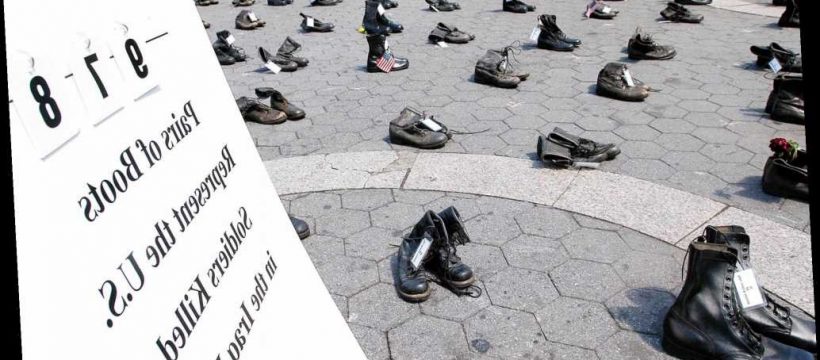Jeffrey Goldberg published a bombshell story that convulsed the nation. No, I’m not talking about his recent Atlantic magazine piece claiming, based on the testimony of four anonymous sources, that President Trump had grossly disrespected America’s dead and wounded warriors in 2018.
I’m talking about Goldberg’s New Yorker feature claiming that “the relationship between Saddam’s regime and al-Qaeda is far closer than previously thought.” Published less than a year after 9/11, the story fed into the fervid pro-war atmosphere that then gripped the nation.
Headlined “The Great Terror,” the essay was based on a reporting trip to Iraq’s northern Kurdish zone. It recounted, in terrifying and admirable detail, Saddam Hussein’s 1988 poison-gas assault against Kurdish civilians in the village of Halabja.
Along the way, Goldberg did other things, too — chief among them, speaking to alleged terrorist detainees in a prison run by a pro-regime-change Kurdish faction.
“It appears to be well kept and humane,” Goldberg observed. “The communal cells hold 20 or so men each, and they have kerosene heat, and even satellite television. For two days, the intelligence agency permitted me to speak with any prisoner who agreed to be interviewed.”
Goldberg recalled feeling “wary” about interviewing prisoners in a Mideast prison. Nevertheless, “the officials did not, as far as I know, compel anyone to speak to me, and I did not get the sense that allegations made by prisoners were shaped by their captors. The stories, which I later checked with experts on the region, seemed at least worth the attention of America.”
The mostly unnamed prisoners, per Goldberg, informed him “that the intelligence service of Saddam Hussein has joint control, with al-Qaeda operatives, over [a local jihadist faction]; that Saddam Hussein hosted a senior leader of al-Qaeda in Baghdad in 1992; that a number of al-Qaeda members fleeing Afghanistan have been secretly brought into territory controlled by [the local jihadists]; and that Iraqi intelligence agents smuggled conventional weapons, and possibly even chemical and biological weapons, into Afghanistan.”
Goldberg concluded: “If these charges are true, it would mean that the relationship between Saddam’s regime and al-Qaeda is far closer than previously thought.”
To put it rather more crudely: Saddam is warm to and cooperates with al-Qaeda; al-Qaeda did 9/11; draw your own conclusions.
A Kurdish intel chief told Goldberg that “he hoped I would carry this information to American intelligence officials. ‘The FBI and the CIA haven’t come out yet,’ he told me.”
Goldberg went on to relay quotes from a number of pro-regime-change figures, American and Iraqi. Most served to make the case for the seemingly “unlikely” marriage between Saddam’s secular regime and al-Qaeda’s Islamist ideology.
Unnamed Kurdish intel sources, Goldberg reported, believe that “the real leader” of a local terror group “is an Iraqi who goes by the name Abu Wa’el, and who, like the others, spent a great deal of time in bin Laden’s training camps. But he is also, they say, a high-ranking officer of the Mukhabarat [Iraqi intelligence].”
And on and on.
Pretty chilling stuff. The Bush administration made Saddam’s ties to al-Qaeda a key plank of its case for regime change. The war happened. Saddam was toppled. But in the years that followed, the Iraq-al-Qaeda link posited by Goldberg unraveled.
A 2004 CIA assessment undercut “the [Bush] White House’s claim that Saddam Hussein maintained ties to al-Qaeda,” as the Knight-Ridder agency reported at the time. There was no “collaborative relationship” between the two villains, the assessment found.
Two years later, a Senate Intelligence Committee report detailed CIA disclosures that further undermined Team Bush claims “that such ties existed,” as The New York Times reported. The 2006 report found that “Saddam Hussein was distrustful of al-Qaeda and viewed Islamic extremists as a threat to his regime, refusing all requests from al-Qaeda to provide material or operational support.”
Then, in 2009, an adviser to ex-British Prime Minister Tony Blair testified before Britain’s Iraq War Inquiry that as early as 2001, Blair had tried to steer Bush away from the Saddam-al-Qaeda trail. “The [British] prime minister’s response to this was that the evidence would have to be very compelling indeed to justify taking any action against Iraq.”
A year later, Jeffrey Goldberg helped make the case for what would turn out to be a catastrophic war. And he did so by relying, in part, on the claims of unnamed officials and unnamed prisoners in Kurdish prisons.
Sohrab Ahmari is The Post’s op-ed editor. Twitter: @SohrabAhmari
Share this article:
Source: Read Full Article
